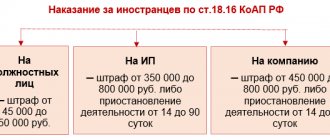Who needs PVTR
All employers must have the document, regardless of their form and status (yes, individual entrepreneurs are also needed), according to Article 189 of the Labor Code of the Russian Federation. Micro-enterprises are allowed to do without a separate document, but then they must include all the rules in employment contracts with employees. These terms and conditions of employment contracts are significant and are subject to change with prior notice.
Since many issues are regulated at once, virtually covering the entire life cycle of an enterprise, the rules always have many pages and sections. The employer will have to draw them up independently, preferably at the very beginning of the activity, since the internal labor regulations are approved before hiring the first employees. And this is one of the first documents that labor inspectors require when checking. If necessary, the document is subject to change.
If employees violate PVTR
Violations of the rules adopted and signed by the employee are fraught with disciplinary punishment. The most common violations are absenteeism and non-compliance with safety regulations. In this case, the employee expects:
- A reprimand that may result in dismissal.
- Deprivation of bonuses. By law, employers have no right to fine.
Of course, when imposing any disciplinary punishment, the employer must comply with the letter of the law, otherwise the employee has the right to sue him.
Model rules
Legislators took care of employers and approved the rules for drawing up PVTR by Decree of the USSR State Committee for Labor No. 213 of July 20, 1984 (no longer in force), that is, back in the Soviet Union and more than 30 years ago. It is obvious that it is almost impossible to use these rules in modern conditions. Theoretically, they can be taken as a basis, since the general principles of the approach to this issue do not depend on time. Now what issues are regulated by internal labor regulations is regulated by the Labor Code of the Russian Federation and industry regulations. Each company independently chooses how to formulate this important document, taking into account the specifics of its work, the wishes of the owners and the opinion of the employees' union. PVTR must be agreed upon with the trade union committee, and this agreement is documented in a protocol and placed on the title page of the local regulatory act.
ConsultantPlus experts discussed how to draw up internal labor regulations. Use these instructions for free.
Is it necessary to approve local labor regulations?
Since there is no responsibility for failure to familiarize yourself, you can take your time with the adoption of this act, or even abandon it altogether. Some employers think so and are deeply mistaken. PVTR must be approved; for their absence, the State Tax Inspectorate imposes fines .
Until 2021, this requirement applied to all legal entities, but after the publication of Federal Law No. 348 of July 3, 2016, the situation changed a little. Micro-enterprises - companies that employed up to 15 people over the last year (Federal Law No. 209 of July 24, 2007) received relief. Such organizations do not have to adopt local regulations, but then it is necessary to conclude employment contracts of a special format: indicating local work rules in the text of the contract (Article 309.2 of the Labor Code).
What sections are needed
In fact, the internal regulatory act of a single company practically duplicates in miniature the large Labor Code of the entire country. The internal regulations include the following sections, which closely overlap with the articles of the Labor Code:
- procedure for hiring employees;
- procedure for dismissing employees;
- work schedule and rest time;
- basic rights and obligations of the employer;
- basic rights and responsibilities of employees;
- employer's liability;
- employee responsibility;
- remuneration procedure;
- incentives and penalties;
- other issues of regulation of labor relations (you can specify in the document requirements for the appearance of employees, the so-called dress code, including restrictions on the use of personal phones during work hours, etc.).
If the employer forgets and does not include in the PVTR any important section that regulates the same section in the Labor Code of the Russian Federation, then when checked by the State Labor Inspectorate, this fact will lead to the issuance of an order, since this is a violation. Consequently, when forming a document, you cannot omit any of the fundamental articles of the Labor Code of the Russian Federation; however, it is also not worth rewriting half of the code verbatim into these rules. It is important to remember the main thing: none of the requirements of the internal regulations of an organization or individual entrepreneur should worsen the situation of employees in comparison with the standards established by Russian legislation. In this case, Article 8 of the Labor Code of the Russian Federation works, which simply cancels such requirements.
How does approval happen?
The necessity and procedure for approving such a local act of the employer is regulated by the Labor Code and its article. 189. They must be published and approved at any enterprise. That is, all creation work is performed by the employer himself.
Important! There is no need to develop them from scratch; you can use a ready-made template, adjusting some points if necessary. In particular, it is imperative to record work and rest time, punishments and rewards, rights, and obligations in relation to a specific organization.
Such a document is often approved at a meeting of members of the organization, and the specific method of approval must be reflected in the charter. If this is not done, then there is a risk that during verification the rules may be declared invalid, and this is already a violation of the law.
What should not be included
Before moving on to drawing up the rules, it is necessary to remember what is included in the internal regulations of the enterprise. First of all, this local act contains the general working conditions in a particular company and the general requirements of its management for employees, since Article 21 of the Labor Code of the Russian Federation directly stipulates that every employed citizen is obliged to comply with discipline and the internal regulations of the enterprise at which he works. Accordingly, the rules will be of a general nature, applicable to absolutely every employee: from the cleaner to the heads of departments. All personal requirements are excluded. This means that all job responsibilities, requirements for workplaces and the characteristics of the functioning of individuals must be prescribed in other documents, which, in particular, include employment contracts, job descriptions and other agreements. There is no place for such requirements in the PVTR.
How often do employers approve PVTRs?
In Part 3 of Art. 68 of the Labor Code states that the employer is obliged to familiarize him with the PVTR before hiring an employee. It might be assumed that in such a case the rules should be issued before the first worker is hired. However, in practice this is problematic. For example, by the time the employee is hired, the trade union body may be in the process of being created, or an employment contract has not yet been concluded with the general director, who, in accordance with the employer’s charter, has the right to sign the PVTR. Also, the Code of Administrative Offenses of the Russian Federation does not contain the responsibility of the employer for failure to familiarize the employee with the rules of procedure.
Thus, the law does not imperatively regulate the period for adoption of the first PVTR. However, this does not mean that it can not be taken at all. It must be remembered that in addition to regulating the employee’s labor activity, this act is also adopted to ensure the interests of the employer. Until PVTR are accepted in the organization, it is impossible to hold the employee accountable for violation of labor discipline.
There is also no time limit for re-issuing or changing the rules. The employer has the right at any time - for reasons, for example, production necessity - to organize work to amend the PVTR or to develop new rules. In this case, the procedure provided for in Art. 190 and 372 TK.
In other words, the frequency of adoption and approval of PVTR is not determined by law - every employer is free to do this with any frequency as necessary.
Acceptance and approval procedures
First, you should get approval from the trade union (if you have one), since its participation in this matter is mandatory. And then indicate the details of the minutes of the trade union meeting.
This is what a sample order for approval of internal labor regulations looks like:
All already working employees are introduced to the new document against signature: a special register or familiarization log is used to record familiarization. It is important in the future to issue rules for careful study by new employees when they are hired. They must confirm that they have read and understood the document by signing the review log. Article 68 of the Labor Code of the Russian Federation regulates this before concluding an employment contract and issuing an order for employment.
The procedure for approving PVTR in an organization: who develops and signs the document
The approval of internal labor regulations is carried out in the manner prescribed by Art. 190 and 372 TK. Analysis of the provisions of these articles allows us to draw up step-by-step instructions for approving the rules of procedure in the organization:
| Step-by-step instruction | Term | Actor | Specific actions | |
| 1 | Decision making and rule development | Indefined | Employer** | Decides to develop rules |
| Established by the charter. Typically legal and/or human resources employees | Developing rules | |||
| At any time (optional) | Employer | Decides to develop new rules | ||
| Established by the charter. Typically legal and/or human resources employees | Developing rules | |||
| 2 | Taking into account the opinion of the trade union | Is not limited | Employer | Submits the draft PVTR and its justification to the trade union*** |
| 5 days from receipt of the project | Trade union | Provides the employer with a reasoned opinion about the project. If the union agrees with the project, proceed to step 3. If there is disagreement, the second step of approval continues | ||
| Is not limited | Employer | Get acquainted with the arguments of the trade union. If you agree with them, you should proceed to step 3. If you disagree, the second step of approval continues | ||
| 3 days from receipt of the union’s opinion | Employer, trade union | Conducting a consultation. If you agree, proceed to step 3. If you disagree, continue with the second step of approval. | ||
| Is not limited | Employer, trade union | Drawing up a protocol of disagreements | ||
| 3 | Approval of the rules | Is not limited | Employer | Approves routine rules |
| 4 | Appeal (optional step) | During the period of validity of the rules | Trade union | If you disagree with step 3, you have the right to choose: − appeal the regulations to the court or government. labor inspection; − initiate a collective labor dispute procedure |
| 5 | Employee familiarization | Is not limited*** | Employer, worker | Familiarize each employee with the accepted rules |
Notes:
Subscribe to our newsletter
Yandex.Zen VKontakte Telegram
* Here the employer is understood as a specific person or management body to which, in accordance with the charter, the appropriate powers have been transferred to initiate the procedure for adopting rules, approving them, etc.
** If the organization does not have a trade union, then the draft PVTR is transferred to a representative elected on the basis of Art. 31 TK. If the organization does not have a representative or any representative body at all, then, taking into account Art. 8 of the Labor Code, a note is made on the rules of procedure about the absence of a representative body, and steps 2 and 4 are skipped.
*** As long as the employee is not familiar with the PVTR, bringing him to disciplinary liability for failure to comply with the rules is unlawful - as established, for example, by the Supreme Court of the Republic of Bashkortostan in cassation ruling dated June 21, 2011 No. 33-8111/111.
Contents of sections
The internal regulations are a very voluminous document; they take into account all current legal requirements. Some of its points cover general norms, and some are more specific. Let's take a closer look at what this act looks like and what you should not forget in each of its sections. The title page contains the full name of the organization and its abbreviated version; it must contain the manager’s visa confirming the approval of the document with a date. This procedure is determined by Article 190 of the Labor Code of the Russian Federation. Next comes the general information section, which briefly explains the concept of the entire act.
An example of how the organizational rules are drawn up on the title page:
Next come the remaining sections, which the compiler places in random order. In each of them, the specific nuances of the organization’s work should be taken into account.
Distant work
If the organization has not previously practiced remote working mode, but due to the pandemic of the new coronavirus infection and the restrictive measures taken, it had to be introduced, changes to the PVTR are necessary. They take into account the working hours outside the main workplace and clarify the responsibilities of employees.
IMPORTANT!
The rules must be updated immediately after the decision is made to transfer employees to remote work. If this is not done, you will be held accountable under the Code of Administrative Offenses of the Russian Federation.
Changes during the transition to electronic work books
After the transition to electronic work books in 2021, new features of hiring and dismissal and the list of documents provided during employment must be taken into account in the new version of the PVTR. In order to approve the internal labor regulations with electronic labor, a separate order is issued for the organization to make the necessary changes. It prescribes the need to comply with the requirements of the law on the generation of information about the activities of employees in electronic form and preparation for the submission of SZV-TD reports according to the established schedule. The order appoints the persons responsible for this work and determines what actions and in what order they need to perform. The result is a sample of internal labor regulations in the new edition for 2021.
The rules take into account the possibility of each employee choosing between continuing to maintain a paper book or providing information in electronic form in accordance with Art. 66.1 Labor Code of the Russian Federation. New employees are required to create an electronic database. The new items look like this:
For all employees who have worked for more than 5 (five) days, work books are maintained in accordance with the established procedure (Article 66 of the Labor Code of the Russian Federation), except for cases where a work book is not maintained for the Employee in accordance with the Labor Code of the Russian Federation.
The Employer electronically generates basic information about the work activity and length of service of each Employee (hereinafter referred to as activity information) and submits it in the manner established by the legislation of the Russian Federation on individual (personalized) registration in the compulsory pension insurance system, for storage in the information resources of the Pension Fund RF. Information about activities includes information about:
- employee;
- his place of work;
- his labor function;
- transfer of an employee to another permanent job;
- on the dismissal of an employee, indicating the grounds and reasons for termination of the employment contract;
- other information provided for by the Labor Code of the Russian Federation and other federal law.
The formation of information about the activities of persons entering work for the first time after the period established by federal law is carried out in accordance with the Labor Code of the Russian Federation; work books are not issued for these persons.
The paper work record book and SNILS, which legislators had previously converted into electronic format, are excluded from the list of documents that an applicant is required to provide when applying for employment.
Disciplinary action
To avoid unnecessary disputes with employees, include in your internal labor regulations a complete list of violations of discipline in the workplace, which, according to the provisions of Article 81 of the Labor Code of the Russian Federation, lead to dismissal (absenteeism, drunkenness during working hours, hooliganism, etc.).
IMPORTANT!
It is impossible to prescribe disciplinary measures not provided for by the Labor Code of the Russian Federation. It is allowed to apply to guilty employees:
- comment;
- rebuke;
- dismissal.
It is possible to specify the rules on violations of discipline that are not disclosed in the code: to cite as an argument the position of the Supreme Court, set out in paragraph 49 of the Resolution of the Plenum of the Armed Forces of the Russian Federation No. 2 of March 17, 2004, where failure to fulfill his duties was cited as a gross violation on the part of the head of the judge, resulting in harm to the health of workers or property damage to the company. It is allowed to prescribe additional punishments, for example, in the form of deprivation of a bonus, in addition to a reprimand and reprimand.
Work time
In the “Working hours” section, you should describe in detail the work and rest schedule at the enterprise, including the length of the working day, week, and even lunch breaks.
For employees with normal working hours, the following working hours are established:
- a five-day work week with two days off - Saturday and Sunday;
- The duration of daily work is 8 hours;
- work start time - 9.00, work end time - 18.00;
- a break for rest and food lasting one hour - from 13.00 to 14.00. This break is not included in working hours and is not paid.
In the same section, you must list all weekends and holidays in accordance with the production calendar approved by the government. If a company operates on a special schedule within the framework of the norms of the Labor Code of the Russian Federation, this must be described in detail in this section.
Guarantees and compensation
It is allowed to indicate individual characteristics in other sections. For example, in the section “Guarantees and Compensations” they provide the specific amount of compensation for delayed wages, which the employer is obliged to pay in accordance with Article 236 of the Labor Code of the Russian Federation. If this size turns out to be higher than the generally established one, this will raise questions from regulatory authorities. You cannot pay less than the minimum wage, even if this is written down in local regulations.
Procedure for adoption of rules
The process of issuing rules is a complex procedure. The management team of the company will need to implement a certain sequence of actions:
- At the initial stage, the director expresses the initiative regarding the formation of rules. This can also be done by the governing body, provided that this provision is spelled out in the Charter. The legislation on this matter does not reflect special deadlines. HR department employees or other authorized employees draw up a draft act.
- The developed sample act is agreed upon with the employee representatives. Most often, these actions are performed immediately after the document is ready. The law does not specify specific frameworks. After carefully studying the project, union members express their opinions. This must be done in written format. It is permissible to indicate comments and suggestions, provided that they are motivated. The response process is limited to five days. When the answer is negative, the first stage is repeated until the union’s consent is obtained. A protocol of disagreement may be drawn up. The law also does not indicate exact time limits for this process.
- The approval of the Rules is being implemented. To do this, the director of the company reflects the mark or creates an order. This act indicates the implementation of the PVTR. There are no time limits.
- Employees are given the opportunity to review the documentation. This applies to all citizens who are hired. In a situation where adjustments have been made to previously existing rules, the entire staff should be informed. The law does not limit terms.
- The document is signed by the company's management. In addition, at other stages, the signature of the union representative and employees will be required. There may also be one more stage that is not considered mandatory. This applies to situations where the company's management and employee representatives cannot come to a common decision.
- When a trade union disagrees with the employer's opinion, it has the right to appeal the project. You will need to contact a judicial authority or State Labor Inspectorate; it is also permissible to take the initiative to start a labor dispute in a collective form.
The approval process has some peculiarities. The law states that the employer must obtain the opinion of union members. When there is no body in question, employees select a representative to whom the project will be sent.
If this representative is also not present, then the second step in the specified algorithm is omitted. There are no obligations regarding the choice of a trade union, representatives of the working class. The issue of approval is important not from the point of view of the law, but from the point of view of labor efficiency. This indicates that the rules being introduced apply to all employees.
Rule structure
The content establishes the conduct of the internal economic life of the organization. They spell out the following nuances:
- procedure for hiring and dismissal;
- the possibility and nuances of replacing an absent employee;
- interaction of the parties under the employment contract with a description of their rights and obligations;
- working hours, as well as a schedule of rest periods;
- wage regime;
- responsibility of each party, including disciplinary responsibility;
- additional provisions depending on the specifics of the institution.
Depending on the legal form of the enterprise, these points may be supplemented at the discretion of management.
General provisions
These include all instructions that establish the purpose of the issued legal acts, the circle of persons for distribution, cases of revision of the PVTR, as well as additional information. Algorithm for appointment and dismissal, required documents necessary to carry out these actions, test period, mechanism for transfer to other positions and nuances of termination of the agreement.
Main points
There are rules that are mandatory for placement in PVTR. Without them, such a document may not fulfill the main function assigned to it. The success of the interaction between the employee and the employer will depend on the completeness and comprehensiveness of the issues covered. These include:
- Rights and responsibilities of a manager. Organizing work in accordance with the terms of the concluded agreement, creating and guaranteeing safe conditions during the fulfillment of their obligations, issuing wages on time without reducing their volume, monitoring compliance with discipline, providing other types of guarantees;
- Rights and obligations of employees. Carry out the duty assigned to him without any complaints, observe discipline and safety precautions, and do not ignore the orders of management;
- Mode. This item is the most capacious because it contains a large amount of information: the time period of the work shift (beginning and ending), as well as the week itself; calculation of shifts every day; lunch break and special time for special categories of professions (drivers, builders, employees carrying out their activities on the street); irregular working hours and variable weekend schedule; the existence of additional paid leave, as well as its duration; salary payment deadline.
These points are basic and mandatory to be reflected.
Disciplinary section
Labor discipline is the most important element of the work process. The issue of elaborating its compliance must necessarily be reflected in the PVTR. In the absence of such a point, the plan will be insufficient and incomplete. The degree of injury risk at work directly depends on it. Organizations dealing with particularly difficult work are not limited only to labor regulations, but also develop additional legal acts (for example, disciplinary regulations). This section will consist of 2 parts:
- Penalties: regulated by Article 192 of the Labor Code of the Russian Federation, which defines the concept of a “disciplinary act” as an action that entails the performance of duties of inadequate quality. Three types of punishments have been established for the above: reprimand or reprimand, as well as dismissal. Other sanctions are not provided for by law, and therefore should not be included. This state of affairs will only affect ordinary workers. Additional regulations have been developed for persons serving under contract, as well as in government agencies. It is important to follow the collection procedure. Be sure to take into account the regulations for their removal.
- Incentives: this kind of section may not be present at all, provided that it is included in the local act of the organization. But if it still needs to be developed, then it is worth including information about the types of proposed incentives (certificate, bonus money), as well as incentive motives (conscientious performance of duties, absence of defects). It is also possible to provide for the removal of a previously imposed penalty.
Reflection of these points will allow you to apply punishment in case of negligence of the employee, as well as thank you in case of probable correction.
Legislative regulation
When drawing up internal regulations, any company manager must take into account the requirements of the law. Therefore, it is important to study the provisions of the following regulations:
- Art. 189 and 190 of the Labor Code, which provide the nuances of drawing up this documentation;
- GOST R 6.30-2003, which contains rules for preparing important documentation.
Each company can independently make certain changes to this documentation, so the rules may vary significantly in different companies.







